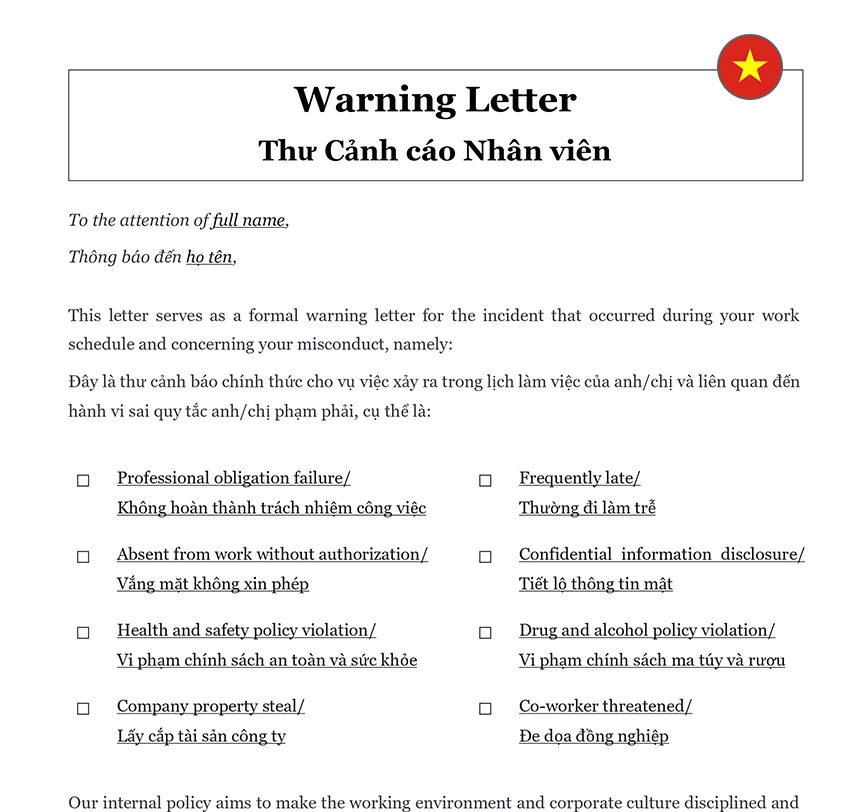Ready to use legal template
Drafted by experienced lawyers
Vietnamese-English translation
Ready to use legal template
Drafted by lawyers
Vietnamese-English translation
Learn more about Employee Warning Letter in Vietnam
An Employee Warning Letter is a formal document issued by an employer to address an employee’s misconduct, underperformance, or violation of company policies. Its main purpose is to clearly communicate the issue, outline expected improvements, and serve as an official record of the disciplinary process. In Vietnam, issuing a written warning is an important part of complying with the Labour Code, especially when progressive discipline is required before more serious actions like termination. At Themis Partner, our Employee Warning Letter template is professionally drafted to reflect best practices and legal standards in Vietnam. Available in both English and Vietnamese, it’s easy to edit in Word format, making it simple to adapt to your company’s needs. Download your copy today to handle HR matters confidently and compliantly.
Table of contents
-
What is an Employment Warning Letter?
-
What is included in an Employment Warning Letter?
-
When should an Employment Warning Letter be issued in Vietnam?
-
How should an Employment Warning Letter be delivered?
-
Can it be used as evidence in legal proceedings in Vietnam?
-
What are the consequences of ignoring an Employment Warning Letter?
-
Is it mandatory to provide a written warning before termination in Vietnam?
-
How should an employee respond to an Employment Warning Letter?
-
Can an employee refuse to sign an Employment Warning Letter?
What is an Employment Warning Letter?
An Employment Warning Letter serves as a formal communication from an employer to an employee, expressing concerns regarding their performance or behavior in the workplace. It is a pivotal document in the employer-employee relationship, aiming to address issues promptly and transparently. This letter outlines specific instances or patterns of behavior that are not in alignment with company expectations or policies, providing the employee with a clear understanding of the concerns raised and the need for improvement.
Through an Employment Warning Letter, employers can effectively communicate their expectations to employees and provide them with an opportunity to rectify their actions. It serves as a proactive measure to address issues before they escalate, fostering a positive work environment and maintaining productivity. By outlining consequences if the behavior persists, the letter encourages accountability and facilitates constructive dialogue between the employer and the employee to resolve issues amicably.
What is included in an Employment Warning Letter?
An Employment Warning Letter usually consists of the following components:
Introduction: Clearly states that it is a warning letter and the reason for its issuance.
Employee Information: Includes details like the employee’s name, position, department, and employee ID if relevant.
Description of Issue: Outlines the specific performance, behavior, or conduct problems that have prompted the warning.
Company Policies or Standards: References relevant company policies, procedures, or standards that the employee has violated.
Impact or Consequences: Explains the potential impact of the behavior on the workplace or colleagues, as well as the consequences if the behavior continues.
Expectations for Improvement: Clearly states the expected changes or improvements in behavior or performance.
Support/Resources: Offers support, resources, or assistance that the company can provide to help the employee improve.
Next Steps: Specifies any follow-up actions required, such as meetings or performance reviews.
When should an Employment Warning Letter be issued in Vietnam?
An Employment Warning Letter in Vietnam should be issued when an employee’s performance, behavior, or conduct falls below the expected standards or violates company policies. Some common scenarios warranting the issuance of such a letter include:
| ➤ Repeated Performance Issues: When an employee consistently fails to meet job requirements, deadlines, or quality standards despite previous feedback or warnings. |
| ➤ Behavioral Concerns: Instances of misconduct, insubordination, harassment, or unprofessional behavior in the workplace. |
| ➤ Policy Violations: Breaches of company policies, rules, or procedures, such as attendance, safety, or confidentiality policies. |
| ➤ Poor Work Ethic: Lack of effort, motivation, or commitment to job duties, leading to a decline in productivity or morale among colleagues. |
| ➤ Customer Complaints: Complaints from clients, customers, or other stakeholders regarding the employee's behavior or performance. |
| ➤ Failure to Meet Targets: When an employee consistently fails to achieve performance targets or goals set by the company. |
| ➤ Conflict Resolution: As a formal step in resolving conflicts or disputes between employees or between an employee and their supervisor. |




